By Lakhram Bhagirat
Teaching takes patience and one of the major driving forces behind one’s decision to take up the profession is the mere fact that they love doing it. A teacher who truly loves their job would exude a certain level of passion every time they stand before the classroom.
They make the best use of the very limited resources available to them and they go above and way beyond the call of duty to ensure that those in their care are afforded the best opportunities. They are the substitute for our parents and quite often become our role models because of their level of drive and passion.
A great teacher is one who can be patient even in the most challenging situations. Love for the profession cannot be taught, rather, it is something one has to develop. It makes no sense going before a classroom full of impressionable minds and not love what you are doing.
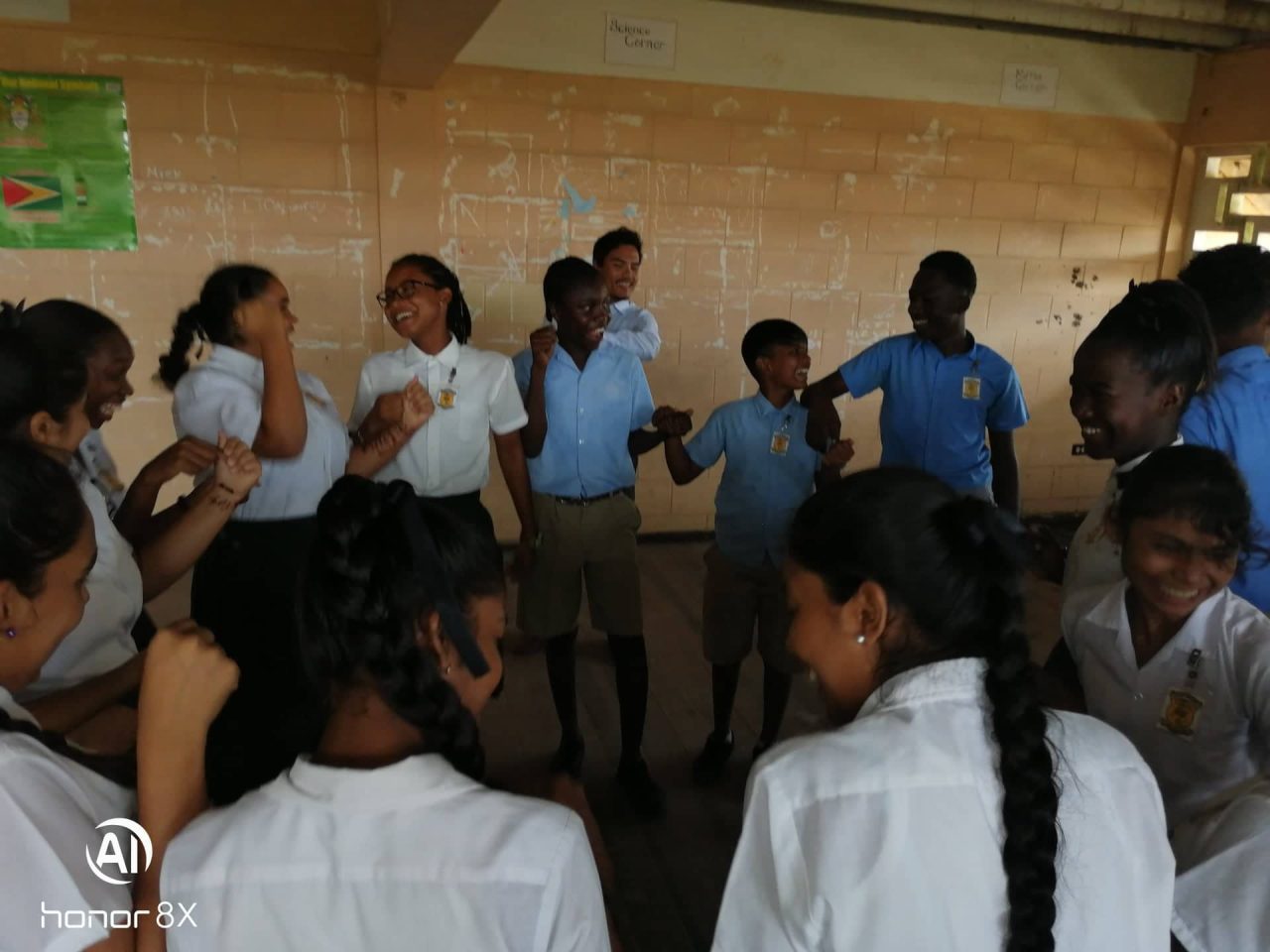
The love for teaching has been engrained in the being of André Ramon Ramaldo despite the profession not being his first choice— although it could be considered as his first job. Romaldo comes from a long line of successful teachers whose impact and contributions are immeasurable.
Some would say it was destined for him to become a teacher because of the fact that it was the ‘family business’ but for him, it has been a beautiful journey of self-realisation.
It is said that a teacher never stops learning because of the fact that they encounter children from all walks of life with their unique stories. That, for Romaldo, makes the job all more interesting.
The 29-year-old English teacher hails from the ancient county of Berbice where he received his education. As we have established before, teachers are quite a few in his family and it meant that emphasis was placed on attaining a quality education. There was no such thing as skipping school or refusing to do homework.
While he said that his childhood was ordinary, it is quite evident that it produced an extraordinary individual.
“My parents and grandfather ensured my siblings and I were educated both academically and spiritually. Going to school was a must, I don’t ever remember being kept home from school and church. From a very young age, I was thrust into the world of public speaking. I represented my nursery school, at a science fair and presented my project on wind turbines,” he recounts.
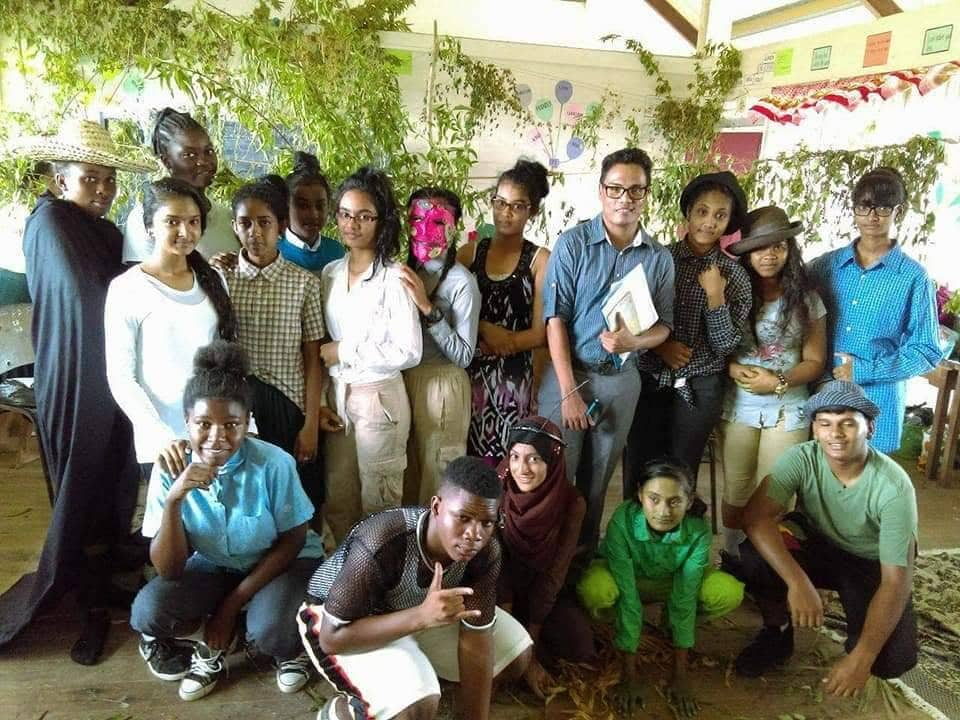
Romaldo would, throughout his school life, represent the various institution in public speaking competitions, thus, instilling in him a level of bravado and love for the art. Those experiences are what he credits as his driving force and the sole reason he is such an outspoken person today.
As a Grade Six student, Romaldo’s interest was piqued when everyone began urging him to become a lawyer since he was so exceptional at public speaking. It went from a casual suggestion to his main goal as he entered into his secondary life. The goal was to become a lawyer and he worked to position himself on the path to accomplishing that. He took comfort in the fact that as a lawyer, he would be equipped to address the needs of those that required his services but most importantly, he would be positioned to help underprivileged children.
“Of course this never happened; instead, in 2011, after a teacher colleague sat me down and talked sense into me, pointing out how well I worked with my students. Her exact words were ‘André you are no lawyer, you are a teacher, and we need you, the students need you’. Around that same time I was reading a biographical account of my great grandfather, the section about his life as an educator and headmaster inspired me to pursue a career in education and teaching.
So, in September of 2011, I commenced training at Cyril Potter College of Education. I originally wanted to get trained as a Social Studies teacher but the Vice Principal at the time talked me into pursuing English. I have always had a knack for teaching others. Coming from a family of educators, it was in my blood as people would say. I have had good role models growing up. My mother would tell me stories about my grandmother, who was herself a teacher, and how she would take great care to ensure her pupils learn, even if it meant holding their hands as they learned to write. My great aunt, who was a formidable figure during her days as a teacher, always inspired me to be effective and efficient and ‘prepared’. She somehow has set the standard,” he noted.

As you would have figured, Romaldo started teaching when he came out of Secondary School but in addition to teaching, he also mentored youth in the Line Path, Skeldon community. He became involved in Youth Can Move the World, a programme focused on personal and community transformation, and engaged many youths in the process of contributing to the development of their community. So far, he has taught at Tagore Memorial Secondary, St Rose’s High and is now at the Bishops’ High.
For him, much of the knowledge he now possesses, particularly in working with children, was developed during that time. A stringent follower of the Bahai Faith, Romaldo allowed his service to his community to play a big part in his teaching style.
“When I started my teaching career in 2009, I was immersed in the teachings of the Bahai Faith. I had experienced a personal transformation having just learned about the principles of the Faith. I was particularly impressed and inspired by the Faith’s teaching on the purpose and importance of education. Thus, a lot of my own epistemology about education had been inspired by the Faith and I went about doing my job with just that in mind. I commenced teaching knowing the importance of academic education but also knowing that without moral education, an individual amounts to nothing.”
When he joined the profession, Romaldo was particularly rudely awakened by the poor treatment of students followed by the utilisation of corporal punishment as a means of discipline. Those were two things that made him feel powerless but he decided that change had to start with him; so he began swimming against the proverbial current.
Being a new teacher came with some amount of fear because of the fact that students became observant and from the moment they smelled fear they would pounce. He recalled one student that was on the bad list of every teacher and the warnings he received before entering that student’s class. However, he treated the student as he would any other and never had an issue with him behaving unmannerly in class.
It is his treatment of every student as equals that sets him apart and has contributed to motivating them to aim for the stars but reach beyond. He empowers his student to believe that there is no unachievable task so that they can tap into parts of them that they did not know existed.
“Over the years, I learned that many students come from broken homes and communities and I saw the need to be compassionate and open-minded to the various realities of students. The board chairman of the school always encouraged teachers to be the ‘significant other’ for our students. This is taken to heart as I realised many students needed such a person.”
When asked about what advice he would give to young teachers, this is what Romaldo had to say:
“Teaching will not make you a fortune, it’s a noble profession, a calling some would say. As teachers, you have an opportunity to awaken and animate the innate qualities of your students. You help bring to life their talents and their varied abilities. A successful teacher is one who is compassionate and takes time to connect with each student, I know this can be a challenge when our classrooms are overflowing but work out a strategy where you have time to have a one-to-one with each student.
“Be prepared, students sense when a teacher is not prepared and they take advantage of that. Be several steps ahead of your students, like them, you must also know about the latest piece of technology, students appreciate when teachers are relevant. Set out your expectations for your students, let them know that you are there to guide and assist them, let them know you expect them to be respectful and responsible. Encourage students to express themselves, cultivate a culture in your classroom where every student has a voice, an opinion.
Teach your students people skills. Promote inclusivity, be aware of those who have special educational needs. Let the hidden curriculum you reveal to your students be seen to be positive. They are looking at you when you interact with your seniors and your equals. They are looking at you when you are out of the classroom. Yes, you have to live your life but do not bring ill repute to the profession. Never be afraid to say ‘ I don’t know’, it’s better to say this than lie. Be the kind of teacher you would want. Be a light, an inspiration to your students.
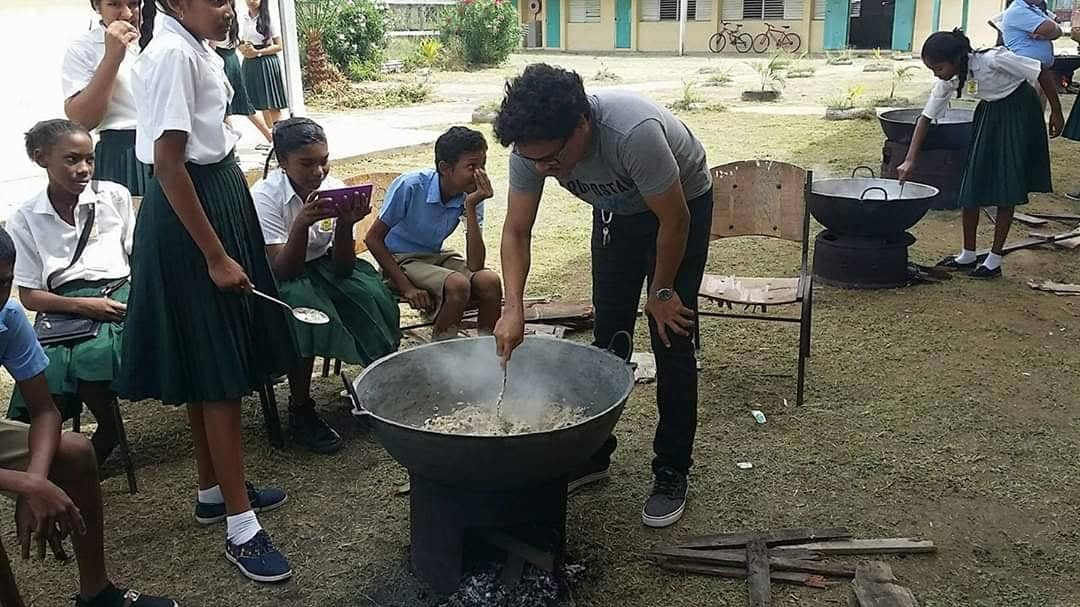 School cookout
School cookout
I would like to see the removal of corporal punishment from the system. Schools should be safe spaces. We have to move away from the slavish mentality of flogging as a deterrent to wrongdoing or indiscipline. As such, all schools should be equipped with school counsellors or psychologists. Values education should be given the same degree of importance as academic education. Schools should be more inclusive.
I believe the teacher to students’ ratio needs to be fixed. There are still classrooms where there is 1 teacher to 35 students. This means we need to build larger schools or expand existing ones or increase the teacher to student ratio as is the case in Finland.
I strongly believe if, at the formative age, pupils learn soft skills such as social graces, communication abilities, language skills, personal habits, cognitive or emotional empathy, time management, teamwork and leadership traits we will be on the way to a transformed Guyana in years to come. Personally, I feel pupils are weighed down literally and metaphorically at the primary level with all focus on academics – National Grade Two, Grade Four and Grade Six Examinations drain our pupils.
Most certainly one of the major boosts to the education system will be paying teachers better salaries so their motivation will increase.
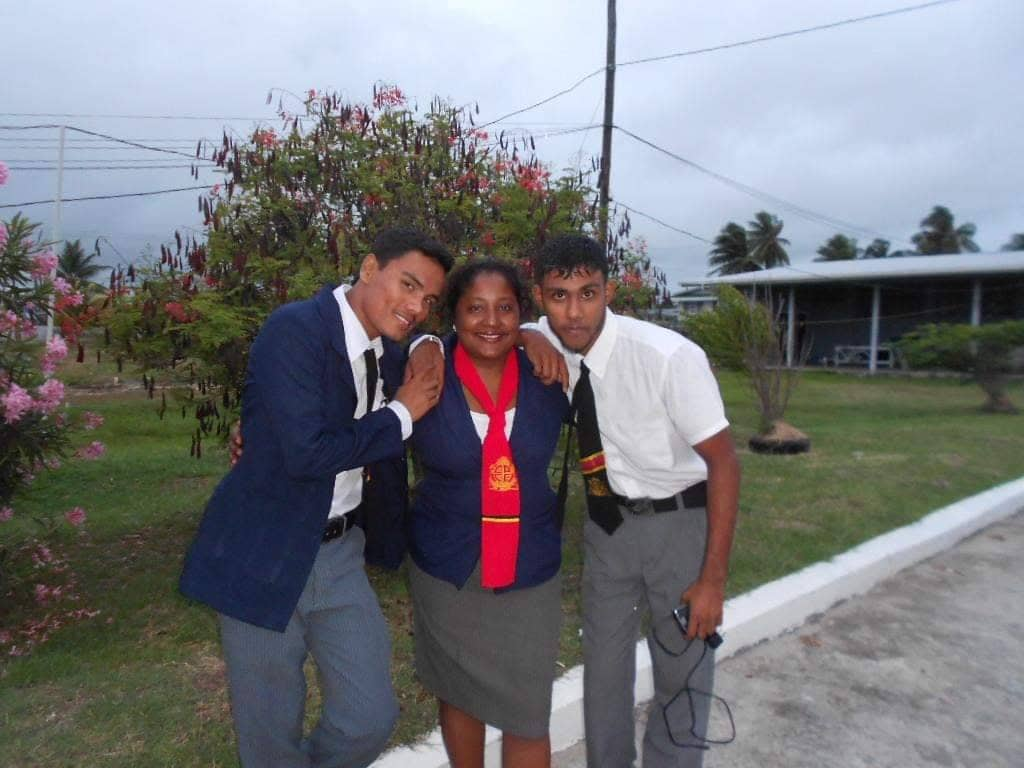
It is also my hope that much more emphasis would be given to the teaching of Reading and Language in the primary curriculum. Undoubtedly, an excellent foundation in Reading will result in success in other subject areas and far less school dropouts. While all students have equal opportunities to learn how to read I am not sure that the opportunities are enough nor equitable.
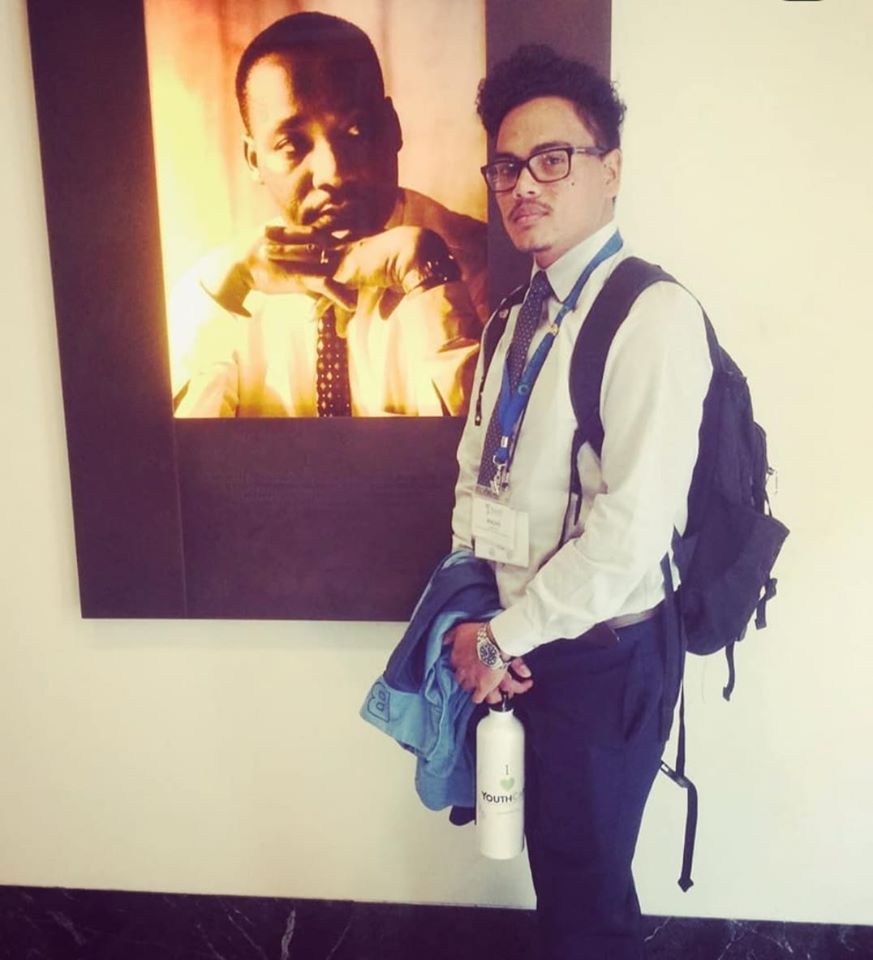
A recurring 50 per cent pass rate in English at the primary level is by far not enough. We must also have systems in place to help struggling readers, and we must be able to screen pupils for dyslexia so that if there is a need for special education, it is available.”











